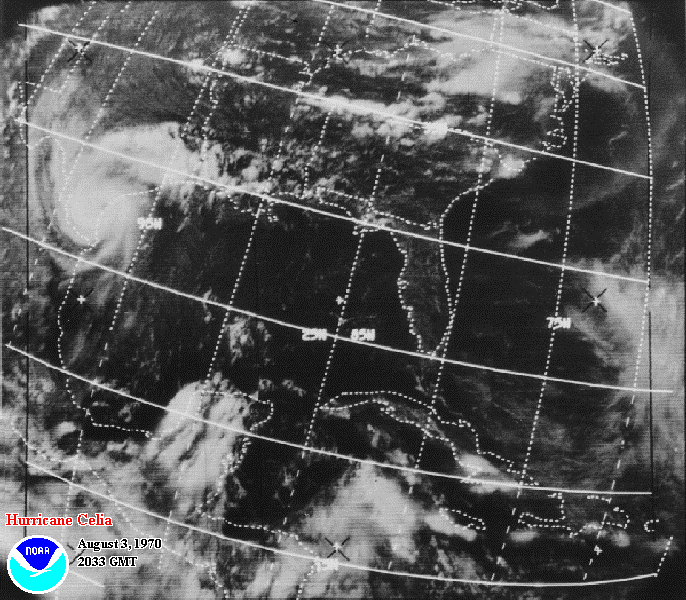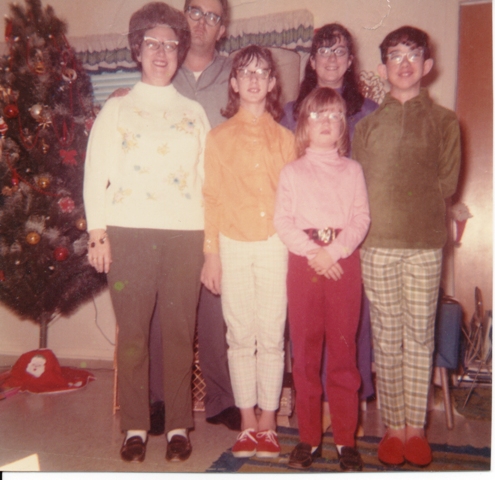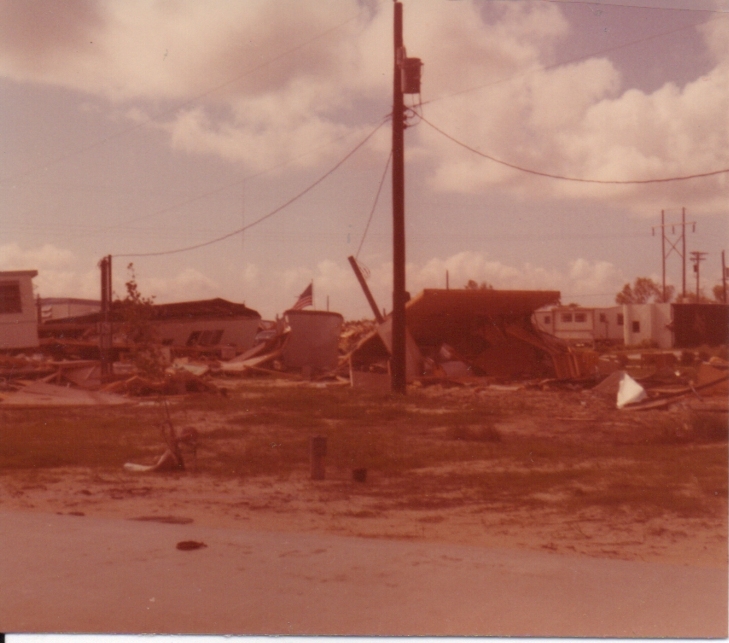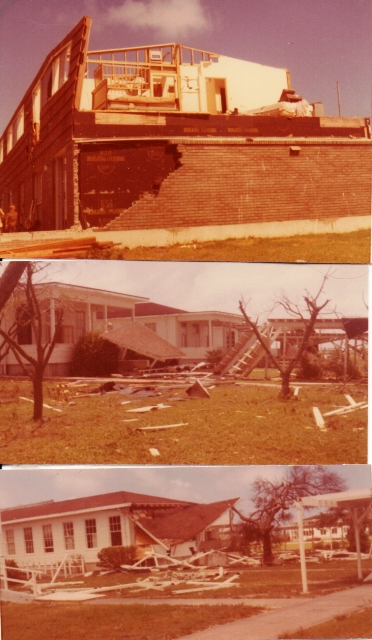[spacer height=”20px”]
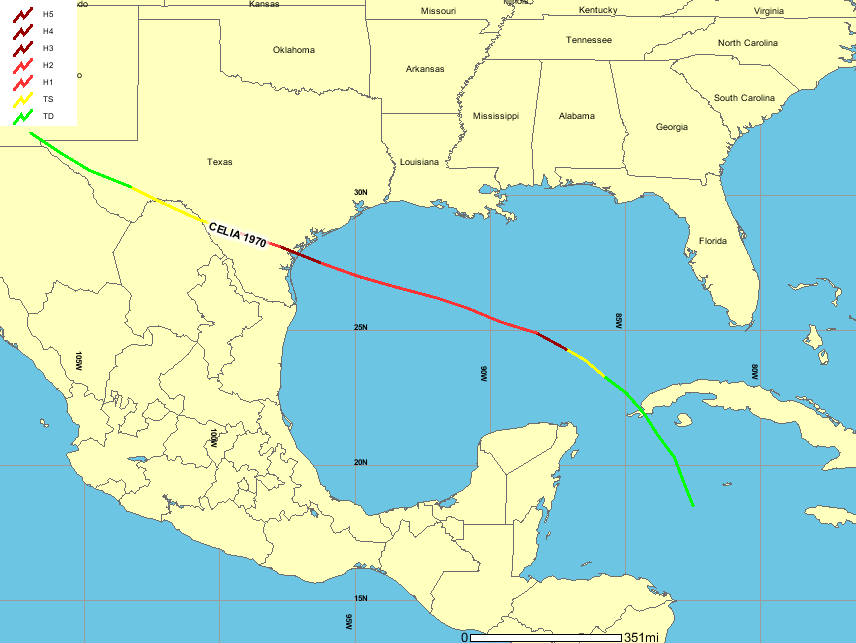
National Weather Service Map
[spacer height=”20px”]
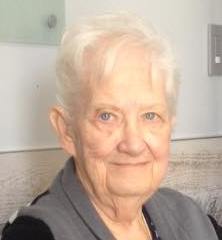 In the summer of 1970, Marcella Campbell McEnulty Slough faced Celia, a horrific and most unwelcome visitor and the last major hurricane to make landfall on the middle Texas Coast. This is Marcella’s story – in her own words – of how she, her husband Ira, and their four children (Loretta, Terry, Jackie, and Joe) fared in the days leading up to and following Celia’s arrival. She wrote this story and mailed it to all of her family and friends who wanted to know how everyone was doing after the storm. Mrs. Slough has lived in Flour Bluff since January 1969.
In the summer of 1970, Marcella Campbell McEnulty Slough faced Celia, a horrific and most unwelcome visitor and the last major hurricane to make landfall on the middle Texas Coast. This is Marcella’s story – in her own words – of how she, her husband Ira, and their four children (Loretta, Terry, Jackie, and Joe) fared in the days leading up to and following Celia’s arrival. She wrote this story and mailed it to all of her family and friends who wanted to know how everyone was doing after the storm. Mrs. Slough has lived in Flour Bluff since January 1969.
[spacer height=”20px”]
On Friday, July 31, 1970, we were informed, via our friendly TV weatherman, that tropical depression #4 was 220 miles SSE of Cuba. At that time, we hardly gave it any notice. Saturday’s noon news announced it had intensified into a tropical storm. We spent a normal Saturday with everyone going about their normal duties, and by the 10 p.m. news, she was a full-fledged hurricane named Celia with winds of 115 MPH, heading NNW towards the northern Texas Coast. We were all saying, “It will never come our way.” You know — it always happens to someone else, right?
Ira had the duty at the Naval Hospital Pharmacy Sunday, so he took the car at 7:30 a.m. and went to work. We’d been to the Sunday obligation Mass on Saturday evening, so the rest of us slept late. Sunday was spent as any other except we pulled out our hurricane map and began to track the storm with a new position given every 2 hours on TV. Loretta worked on a rock picture in her room; Joe went next door to play pool with a friend, Terry and Jackie were busy trying to find out how to get registered with the Flour Bluff Recreation Center, while I spent the afternoon and evening trying to get caught up with correspondence. Channel 3 put out a hurricane watch Sunday afternoon, and we were told if Celia continued its present course, it would it the northern coast of Texas, and we would be on the backside of some of the wind and rain, so it was advisable to pick up all the loose items outside. I called Ira, and we agreed that it should be done right away. Joe brought the trash barrels, tether ball pole, hoses, and anything else he could find loose into the garage. The youngest girls turned in at 9 p.m. with visions of a bowling trip, tour of the Navy Base, and a trip to the San Antonio Zoo with the Recreation Group on their minds. Loretta had a babysitting job until 10:30, and Joe and I watched the late movie.
[spacer height=”20px”]
[spacer height=”20px”]
At 1 a.m. Monday, August 3rd, TV 3 announced a change in direction to WNW of our infamous lady “Celia” putting us under a hurricane warning and that they would continue to be on the air 24 hours a day for the next couple of days. Little did they know that they would be off the air in 14 hours. Ira was still on duty, so Loretta, Joe, and I watched the late show #2, #3, and #4, and by 7 a.m. we were all sure Celia was going to pay us an unwelcome visit. We all began to busy ourselves taking care of the items on our hurricane check list. Every jar, pitcher, water jug, container, and even the bathtub were filled with water because of the fear of water pollution. We got out our portable radios and checked all the batteries and then made sure each of us had a working flashlight. Loretta found all our candles, candle holders, and finally the Christ Candle. We then took a short break and lit the Christ Candle with each of us asking God in our own way for help, courage, and safety. Then we got back to our check list with Joe going to the end of the street to get a bucket of sand to use in case of fire. Mr. Robertson, a neighbor, took out a few boards of our back fence to keep it from blowing down. Ira got off work at noon and stopped to buy non-perishable food and ice and will the car tank with gasoline. He brought home masking tape and taped our windows, and we opened the ones on the south side of the house to keep our house from becoming a vacuum. These were all checkpoints on our list.
Ira, Robbie, and Mr. VanPelt talked, and we all decided to ride out the storm in our homes while several of our neighbors had already packed and left for San Antonio. The wind and rain began about 1?30 p.m. from the north. Loretta put a plastic bag over our movie camera and took some pictures of our blowing palm tree. By 2: 15 the aluminum stripping around my flower beds was beginning to pull out at the ends and wave around in the air like a snake, so Ira ran out and pulled it into the garage and secured the garage doors. By 3 p.m. hurricane force winds were clocked at the Naval Air Station. Jackie Harlin called Loretta (he lives behind us), and she told him we were sending him our fence via the North Wind, and he said, “I’ll send it back later by way of the South Wind.” Our phone then went out.
We all went from room to room checking on windows, etc. Water began to pour in around all the windows and the front door. We used all our towels, blankets, throw rugs, and bedspreads to try to soak it up before it got to our furniture. As the wind at our house began to shift towards the west, it intensified, and we heard on the radio that it was clocked at the airport as sustained 120 MPH winds with gusts every 15 seconds as high as 161 MPH. One of our storm rules was to listen to our radios or TV for advisories on safety precautions. As the wind came around to the WSW at 3:40 p.m., we lost all electrical power, and so did all the radio, TV stations, and even police radios. We were virtually cut off from any kind of communication. Believe me, we were scared! Then we saw our fence blow down and pieces of trees, wood, and our neighbors fiberglass green house go flying around the neighborhood. We tried to find any kind of radio station, and finally KINE from Kingsville, Tx., came through with Citizen Band operators from Corpus Christi telling them the furor that was happening everywhere. This was one hurricane that touched everyone in some way — some only slightly and some losing all they had.
[spacer height=”20px”]
(Radio report from Eddie Truesdell, formerly of KSIX radio in Corpus Christi, TX.
[spacer height=”20px”]
Corpus Christi had been prepared for a hurricane like Beulah or Carla had been, but Celia was quite unpredictable. By 7 p.m. the winds had begun to die down here, and even though it was still raining, we all went outside to see the damage. Two of our neighbors’ roofs were laying in their yards, so all got busy to mop up the water in their homes. As our local newspaper wrote later, “A spirit of neighborly cooperation draped the city like Christmas tinsel.” When darkness fell, and I do mean darkness, with no electricity in our entire city and no cars on the streets because of the curfew, we all knelt once more around our Christ Candle, which was our only light, and said prayers of thanks because we were all alive. Then miraculously the phone rang, and it was my mother. With so many lines down and long distance lines tied up everywhere — she had gotten through and it was so good to be able to tell someone we were all fine. Finally, being completely exhausted, we all slept.
Tuesday morning was a bright sunny one — but also hot and muggy. We hardly had any water pressure. There was no water pollution, but we were only getting a trickle of water so we used the water in the pitchers. We still had no phone or electricity and still only KINE on the radio. Gasoline pumps run on electricity, so there weren’t any gas stations open.We were glad our car tank was full. Ira went to work. Everyone in the block was busy hanging out wet towels, blankets, rugs, putting out wet mattresses, and cleaning up debris. We cleaned out the girls’ room and put their rug on the driveway to dry. The mosquitoes were out in full force. We were told by radio that it could be 2 weeks before we got electrical power, and I began to wish for a kerosene lamp and a good, old-fashioned wash board.
Ira got off early, and we took a ride to see some of the damage and take a few pictures. We passed 2 trailer courts where only one or two looked livable. Mobile homes were upside down, and some had just exploded from pressure. If I’d had any doubt about the destruction of Celia, one look at the new housing at the Naval Air Station stopped it. Three hundred families were left homeless as over half of the $6 million development was demolished, and the rest was heavily damaged. I said a small prayer of thanks once more that we hadn’t gotten base housing. Every neighborhood from Flour Bluff to Calallen had shattered buildings, broken or uprooted trees, tall palms that were just snapped off, homes without roofs from small frame houses to $100,000 homes on the Bay Front. The downtown streets, as the newspaper put it, looked as if there had been a snow storm from broken and shattered glass everywhere, sailboats and fishing boats were piled on top of each other, and our beautiful city in a shambles. Even with all this destruction, there was an air of humor as people put up handwritten signs such as “Open House”, “Rummage Sale”, and one woman tacked a “Garage Sale” sign on her garage door — there was no house. Also, there were flags flying from anything homeowners could fasten them to, which was very heartwarming. Curfew was 7:30 p.m., so we came home, ate leftovers from our barely cool refrigerator, and turned in to try to sleep in a very hot, damp, and humid house.
[spacer height=”20px”]
[spacer height=”20px”]
[spacer height=”20px”]
We arose Wednesday morning to find we had water pressure, and until then, we didn’t realize how great it was to take a long leisure shower. Other small things that we take for granted, such as an ice cube, were becoming quite important. KRYS was now broadcasting with a gasoline powered generator, and as soon as ice was brought into the city and the location was announced, hundreds of people were lined up to get a small block. Comments were made that this was more like a war disaster than a hurricane. TV 3 was back on the air, but no one had any electrical power to watch. No one really seemed to miss TV — the soap operas, cartoons, etc.– we had our ears tuned to radio listening to all announcements about how our town was being put back together. We were advised to empty our refrigerators of all frozen food, so Loretta took our meat next door and cooked it, and what we couldn’t save we threw away. It seemed such a shame, but everyone around here had the same problem we had. Families were eating better than they had in months as steaks and roasts were used up. Barbecue pits were fired up as several families in one block got together to share what they had.
Thursday was spent very much like the day before. Ira pulled duty, so being alone we got in one of those neighborhood get-togethers that seemed to be happening all over the city. If you look long enough, you can find something good can come from a hurricane, such as bringing people together. There just never seems time to get friendly with neighbors as long as there is TV and an air-conditioned house.
Friday, August 7th, we regained our electricity. We were very lucky because as I write this story (This is August 15th), some 40% of the city is still without power or phones. The girls got their room back to normal pace, but as citizens of Corpus Christi, the Sparkling City by the Sea, it will be a long time before we see our city sparkle. If Celia thought she had destroyed our city completely, she had forgotten one element — people. Corpus Christi will be all right — it has people.
Marcella, Ira, and family
P.S. I want to sincerely thank everyone who called to express their concern about us…those calls were really appreciated. We were so cut off from the outside, and hearing a familiar voice certainly showed us that we were in a lot of people’s thoughts. Thanks again!!!
From the editor: This personal account reveals the heart and spirit of human beings, especially when they are under extreme circumstances.Through this telling, we are told how to prepare, how to treat one another, and how to make the best of a bad situation. For those too young to remember or who did not live through Celia, the video below about the days following Celia’s visit will give credence to Mrs. Slough’s story.
[spacer height=”20px”]
This video was made by Central Power and Light, now AEP, after Celia came to visit.
[spacer height=”20px”]
The Hugo Ritter family who lived along Laguna Shores in 1919 rescued a boy who washed up during the 1919 storm. Sadly, the boy died before he could give his name or his place of origin. The following YouTube video posted by Ronald Jorgenson tells similar stories about another hurricane that devastated Corpus Christi. You will recognize some much younger but familiar faces.
